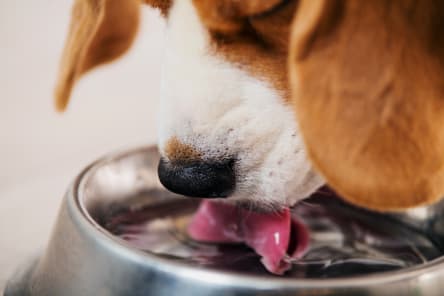Good Suggestions To Choosing Best Vitamins For Dogs
Good Suggestions To Choosing Best Vitamins For Dogs
Blog Article
Turmeric (Curcumin) Assists With Joint Health For Dogs As Well As Cats.
Turmeric is, in particular the active ingredient curcumin is recognized for its potential benefits to support joint health in both dogs and cats. How turmeric can benefit pets suffering from joint pain:
Anti-inflammatory Properties
Reduce Inflammation
Curcumin (the active component of turmeric) is an anti-inflammatory compound that has powerful properties. It blocks the actions of cytokines, enzymes and other molecules that cause inflammation.
Curcumin can reduce the joint inflammation. This helps to reduce swelling and pain that can be caused by arthritis, as well as other joint diseases.
Antioxidant Effects
Oxidative Stress Reduction:
Curcumin is an antioxidant. It neutralizes free radicals that cause cell damage and inflammation.
Benefits by reducing oxidative stress it is possible to protect your joints from injury and ensure the health of your joints.
Pain Relief
Natural Painkiller:
Curcumin's ability to relieve pain is achieved by modulating pain receptors and decreasing pain perception.
Benefits: Natural pain relief for pets can assist them in being more active.
Cartilage Protection
Cartilage Breakdown
The function: Curcumin helps inhibit the enzymes responsible for breaking down cartilage.
The benefits of protecting cartilage: This assists in maintaining joint function in pets suffering from joint issues.
Immune System Modulation
Balanced Immune Reaction
The function: Curcumin helps regulate the immune system and promotes an appropriate response to inflammation.
Benefits: A healthy immune system can help to stop excessive inflammation and increase joint injury, thereby improving overall joint health.
Overall Benefits for Joint Health
Turmeric is a great ingredient to improve mobility for pets suffering from joint pain by reducing inflammation, pain and preserving cartilage.
Improved Quality of Life: Pets with less pain and more ease of movement tend to be more active and engaged which results in a higher living quality.
Usage and Considerations
Dosage: The dose of curcumin or turmeric that you give to pets will be contingent on the weight, size, and the health requirements. Follow the guidelines on the label or those of your veterinarian. For greater absorption, extracts from black pepper (piperine) are often combined with curcumin.
Turmeric supplements for pets are available in capsules (or powders), chews (or chewables), and other varieties. A high-quality pet-specific item is the best way to ensure security and efficiency.
While it is generally considered to be safe, it can cause stomach upsets in some pets. If you start with a lower dose and gradually increasing the dosage, you can minimize the negative effects. You should also monitor your pet for any adverse reactions like vomiting or diarrhea.
Conclusion
Turmeric is, and in particular the active ingredient curcumin offers many benefits to joint health. Its antioxidant, anti-inflammatory and pain relieving properties help reduce joint pain and swelling, protect cartilage, and improve overall joint functionality. Regular intake of turmeric supplements can benefit pets with joint pain and inflammation to increase their mobility. Take a look at the top rated more hints about kidney failure in dogs for site tips including pet calming supplements, pet supplements for pets with fear of strangers, pet immune system supplements, pet dental health, pet supplements for pets with fear of grooming, pet supplements for pets with skin rashes, pet quercetin supplements, pet skullcap supplements and more.
How Do Cat And Dog Kidney Inability Aided By Omega-3 Fatty Acids?
Omega-3 fatty acids, like EPA (eicosapentaenoic acids) and DHA - docosahexaenoic acids - can support kidney health for cats and dogs. What they do to assist in managing kidney disease:
Anti-inflammatory properties
Reduce Inflammation
Function Omega-3 acids have anti-inflammatory properties and decrease the production of the cytokines, eicosanoids and other pro-inflammatory substances.
Benefits: Omega-3s can reduce inflammation in the kidneys and can help improve kidney function.
Blood Pressure Regulation
Lowering Blood Pressure:
Function: The omega-3 fatty acids help to regulate blood pressure by improving vascular functions and reducing inflammation in the system.
Benefits: Lower blood pressure can lower the stress on the kidneys. This helps to stop the progression of kidney disease and safeguard the remaining kidney function.
Proteinuria Reduction
Reducing Proteinuria:
Function: Omega-3s are believed to decrease the amount of protein that leaks into urine. This is called proteinuria and it's a common issue in kidney disease.
The benefits of decreasing proteinuria This protects kidney function and minimize further kidney injury.
Glomerular Filtration Ratio (GFR), Preservation
Supporting Kidney Retention
Function Omega-3 fat acids help maintain the integrity of the glomerular filterate this is the process by which the kidneys filters blood.
Benefits: A stable GFR helps to preserve kidney function and reduce the progress of chronic renal disease.
Food Stimulation and Nutritional Support
Enhance Appetite
Omega-3s are able to increase appetite in animals with kidney disease, which often suffer from a decrease in appetite.
Benefits: A better diet improves overall health and help maintain the body's weight and muscle mass, which is crucial for pets suffering from kidney disease.
Cardiovascular Health
Helping Heart Health
The function of Omega-3 fats is to support the cardiovascular system by the reduction of inflammation, reducing blood pressure, and improving lipid profiles.
Benefits: A healthier cardiovascular system can reduce the chance of complications that are associated with kidney failure, such as heart disease, and enhance overall health and well-being.
Antioxidant Effects
Reducing Oxidative Stress:
Function: Omega-3 fats have antioxidant properties, which aid in reduce oxidative stresses within kidneys.
Benefits Reduced oxidative stress can help ensure the protection of kidney cells as well as enhance kidney function.
Considerations and Usage
Dosage & Administration: The amount of omega-3 fatty acid to administer is contingent upon the size, weight, and overall health of your pet. The recommendation of the veterinarian or product's label is crucial. Omega-3s are available in fish oil supplements for pets.
Omega-3 supplements can be found in many forms. They can be found in capsules, liquid oils and chews. Pick a reputable product to ensure safety.
Omega-3 supplements can trigger stomach upsets in a few animals. You can reduce side adverse effects by beginning at the lowest dosage, and then increasing it over time. The monitoring of any adverse effects such as diarrhea or vomiting is crucial.
Conclusion
Omega-3 fatty acid supplements may be beneficial in managing kidney diseases in cats and dogs. Their anti-inflammatory, blood pressure-lowering, proteinuria-reducing, and appetite-stimulating properties help support kidney function and overall health. Omega-3 supplements can help slow the progression of kidney disease as well as improve the overall quality of life of pets suffering from kidney disease. See the most popular dogs supplements recommendations for blog tips including pet skin and coat supplements, pet supplements for shelter pets, pet supplements for pets with fear of injury, pet egg protein supplements, pet papain supplements, pet supplements for pets with fear of being alone, pet nutrition, pet bilberry supplements and more.
How Can Cat And Dog Yeast Infections Helped With Probiotics?
Probiotics promote the healthy balance of microbial activity both on the skin and the digestive tract. They can assist in combat yeast infections in dogs and cat. Here's how yeast infections are managed by probiotics.
Restoring the Microbiological Balance
Balancing Gut Flora:
Benefit: Beneficial bacteria help maintain the balance of microorganisms within the gastrointestinal tract.
Benefits of a well-balanced gut microbiome: It supports the immune system and helps to avoid yeast-related illnesses (such Candida). This helps to manage yeast infections throughout your body.
Competition with Pathogens
Competition between harmful microorganisms and harmful microorganisms:
Function Probiotics are in competition for resources and space pathogenic microorganisms (causing diseases), including yeast.
Probiotics are beneficial as they outnumber and outcompete yeasts and other pathogens. This decreases their ability cause infections, and maintains a healthier microbiome.
Modulation of Immune response
Immune System Enhancement:
Function: Probiotics support immune system function by altering the production of immune-regulating substances.
Benefits : A more robust response to the immune system will allow you to combat yeast infections more effectively and reduce their frequency.
Antimicrobial Substances that are used in the Manufacturing of
Antimicrobial Factors that Cause Production:
Function The purpose of certain strains of bacterium (such as Bacteriocins) have antimicrobial properties that can be utilized to combat yeast and other pathogens.
Benefits: These antimicrobial substances are able to directly stop the development and spread of yeast. They can therefore be beneficial in treating yeast infections.
Reducing Inflammation
Anti-inflammatory Effects:
Function It is known that probiotics reduce inflammation, that could be related to yeast infections.
Benefits: Probiotics reduce inflammation and can relieve symptoms such as itchiness, redness and pain that are caused by yeast infection.
Support for Skin Health
Maintaining Skin Barrier Function:
Function: Probiotics are a great way to maintain the integrity of skin barrier.
Benefits: A healthy skin barrier is less vulnerable to yeast infections, as it stops yeast and other pathogens from gaining access to the skin and causing infection.
Considerations and Usage
Probiotics are of different types: Select probiotic supplements that include strains that are known to improve the skin and fight yeast infections, like Lactobacillus and Bifidobacterium species.
Probiotics are available in a variety of forms, like chews, capsules, powders or chewable tablets. Probiotics that are applied to the skin are useful for treating localized infections.
Duration: Long-term usage of probiotics is required to ensure microbial balance and prevent repetitions.
Consultation with a veterinarian: Get your veterinarian's advice prior to starting probiotics for your pet. They will be able to suggest the right probiotics, dosages, and durations based upon your pet's individual health needs.
Conclusion
Probiotics can be a beneficial adjunct treatment to treat yeast infections in cats and dogs. In addition to promoting a healthy microbiome balance, improving immunity, and decreasing inflammation, probiotics aid in maintaining overall skin health and decrease the severity and frequency of yeast infections. If used in conjunction with a complete treatment plan, probiotics can help improve the overall health and comfort of pets who are suffering from yeast conditions. View the most popular dogs supplements tips for site tips including pet kidney supplements, pet supplements for pets with dry skin, pet supplements for pets with skin infections, pet supplements for pets with eye problems, pet milk supplements, pet supplements for pets with car anxiety, pet supplements for pets with fear of abandonment, pet prebiotics australia and more.